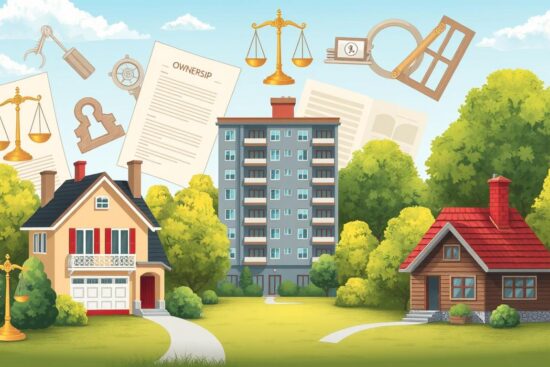
Keeping your real estate in top shape is key to its value and future earnings. Whether it’s a home, office, or rental properties, regular upkeep is vital. This article will share important tips and practices for property owners. These will help protect your investment and boost its worth.
A serene property management office scene featuring a modern desk with a laptop, maintenance tools, and house blueprints on the table, surrounded by plants and a large window showcasing a well-maintained property exterior.
Key Takeaways
- Proper property maintenance safeguards your investment and increases its long-term value
- Adopting a preventive maintenance approach can significantly reduce the need for costly repairs
- Seasonal inspections and routine HVAC system care are critical to maintaining optimal operating conditions
- Developing a comprehensive maintenance budget is key to managing costs and avoiding financial surprises
- Addressing plumbing issues promptly can prevent major water damage and expensive remediation
Understanding Property Maintenance Fundamentals
Maintaining a property is a balance between preventive and reactive methods. Preventive maintenance means taking steps before problems happen. Reactive maintenance deals with issues as they arise. Finding the right mix is key to keeping your property in top shape.
Preventive vs Reactive Maintenance Approaches
Preventive maintenance keeps your property running smoothly. It reduces the chance of sudden breakdowns and expensive fixes. This includes regular checks, routine upkeep, and timely replacements.
Reactive maintenance, however, is like firefighting. It tackles problems as they happen, leading to unexpected costs and interruptions.
Creating Annual Maintenance Schedules
- Make a detailed maintenance schedule with all tasks, how often they’re done, and who does them.
- Focus on important systems like HVAC, plumbing, and electrical. Make sure they get regular care.
- Add seasonal tasks to handle weather issues, like winter prep or landscaping upkeep.
Cost-Benefit Analysis of Regular Upkeep
Spending on preventive maintenance can save you a lot in the long run. A good cost-benefit analysis shows the financial benefits of regular care. It helps you decide how to spend your budget wisely.

A visually engaging scene depicting a homeowner performing various preventive maintenance tasks around a house, including inspecting the roof, cleaning gutters, checking HVAC systems, and watering the garden, all set in a vibrant suburban neighborhood under clear blue skies.
“An ounce of prevention is worth a pound of cure.” – Benjamin Franklin
Seasonal Property Inspection Guidelines
Keeping your property healthy and lasting a long time needs careful seasonal checks. These seasonal inspections are key to protecting your investment. By using a detailed property checkup and maintenance checklist, you can fix problems early. This keeps your home or business in great shape all year.
Weatherproofing your property is a must. In the fall, check the roof, gutters, and outside for damage. Make sure your insulation is good and think about upgrading for better energy use. In the spring, look for damage from winter.
- Inspect the roof for missing, cracked, or curling shingles
- Clean gutters and downspouts to prevent water backups
- Check for signs of pest infestations, such as rodent nests or termite damage
- Trim overgrown trees and shrubs to prevent them from interfering with the structure
By keeping up with these seasonal inspections and maintenance, your property stays safe and valuable. Regular property checkups and following a detailed maintenance checklist save you time, money, and stress.
“Proactive maintenance is the key to preserving the value and functionality of any property.”
Critical HVAC System Maintenance and Care
Keeping your HVAC system in good shape is key. It ensures your system lasts long, works well, and saves energy. Regular HVAC maintenance keeps your place comfy and energy-smart.
Air Filter Replacement Schedules
Changing air filters often is crucial. Dirty filters block air flow, cut down on energy savings, and harm your system. Experts say change them every 1-3 months, based on how much you use it and your surroundings.
Professional HVAC Service Requirements
While you can do some basic upkeep, getting a pro to check your system is vital. A professional HVAC services expert can do detailed checks, spot problems, and make sure your system is top-notch.
Energy Efficiency Optimization Tips
Good HVAC care and energy-saving steps boost your system’s energy efficiency and cut down on bills. Tips include sealing ducts, insulating your home, and maybe getting a more efficient HVAC unit.
“Regular HVAC maintenance is the key to ensuring your system operates efficiently and effectively for years to come.”
By sticking to these HVAC maintenance tips, you’ll keep your home comfy, lower energy bills, and make your HVAC system last longer.
Maintenance Real Estate Budgeting Strategies
Effective maintenance budgeting is key for property owners to keep their investments strong. By using smart maintenance budgeting, owners can plan for future costs. This helps in keeping a steady cash flow for repairs and upgrades.
Tracking expenses is a big part of good maintenance budgeting. Owners should keep a close eye on all maintenance costs. This includes regular upkeep, seasonal checks, and emergency fixes. Keeping detailed records helps in accurately predicting future costs.
- Establish a detailed record-keeping system to track all maintenance-related expenses
- Categorize expenses into different maintenance categories (e.g., HVAC, plumbing, landscaping) for better financial planning
- Utilize budgeting software or spreadsheets to monitor spending and forecast future needs
Property owners should also focus on cost estimation. This means setting aside enough money for important maintenance tasks. Getting expert advice, looking at industry standards, or using past data can help. Accurate cost estimates help in making a solid maintenance budgeting plan.
“Proactive maintenance budgeting is the key to maintaining the value and longevity of your real estate investment.”
By using smart maintenance budgeting strategies, owners can keep their finances stable. This reduces unexpected costs and protects their investments. A well-thought-out maintenance budgeting plan helps in focusing on vital repairs and upgrades. This boosts the property’s health and value.
Plumbing System Maintenance and Prevention
Keeping your plumbing system in good shape is key to avoiding expensive water damage. It also helps ensure water flows smoothly. Focus on finding leaks, keeping your water heater in check, and taking care of your drains. This way, you can catch problems early and prevent them from getting worse.
Leak Detection and Prevention
Check your plumbing often for leaks. Look for damp spots, color changes, or sounds of dripping. Fix small leaks right away to stop water damage and mold. Think about getting moisture sensors to find hidden leaks and turn off the water automatically.
Water Heater Maintenance Guidelines
Looking after your water heater can make it last longer and work better. Clean the tank now and then to get rid of sediment. Check the anode rod for rust. Also, get a pro to check it every year to make sure it’s safe and efficient.
Drain Care and Cleaning Protocols
Keep your drains clear to avoid clogs. Use a plunger or drain snake to clear blockages. You might also want to put mesh screens over your sink and shower drains to catch hair and stuff. Don’t pour grease, oils, or harsh cleaners down the drain. They can harm your pipes over time.
FAQ
What are the benefits of regular property maintenance?
Regular maintenance protects your investment and boosts property value. It also prevents expensive repairs later. It’s key for any real estate owner.
How can I create an effective annual maintenance schedule?
Creating a yearly maintenance plan is vital. It should include both preventive and seasonal tasks. This way, you can plan and budget better.
What are the key steps for conducting seasonal property inspections?
Seasonal checks should cover weatherproofing, landscaping, and structural integrity. This ensures your property is weather-ready.
How often should I replace my HVAC system’s air filters?
Change air filters every 1-3 months, as recommended by the manufacturer. This keeps your HVAC system running well and air quality high.
What maintenance budgeting strategies can I use to stay on top of expenses?
Good budgeting means tracking costs, estimating expenses, and setting aside funds. This helps with both regular upkeep and unexpected repairs.
How can I detect and prevent plumbing leaks in my property?
Regular checks and monitoring water use can spot leaks early. Fixing issues fast and maintaining your water heater and drains prevent damage.










